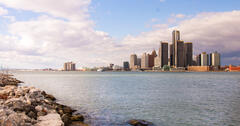
Two new studies show just how much work needs to be done to improve economic performance in Michigan and across the country.
An analysis from Northwood University commissioned by the Michigan Chamber of Commerce looked at the state's economic competitiveness. While the state has improved in the past few years, particularly in state debt and taxation, Michigan has had a steady, decade-long decline in other economic areas compared to the rest of the country.
The study looked at 200 variables including Gross State Product growth, tax policy, regulatory policy and the cost of doing business. While the past few years have brought tax reform and some good regulatory proposals, the state ranks 48th in "general macroeconomic environment" and has lost more than 500,000 people in the past decade. Job growth declined 16.9 percent, while the rest of the country grew 2 percent. Overall, the Great Lake State is ranked 47th out of the 50 states.
The study suggests that becoming a right-to-work state would improve Michigan’s future: "From 2000-2010, the study shows Michigan saw personal income grow by 20.3 percent. This compared to 36.4 percent for the United States as a whole and 39.2 percent for right-to-work states." This matches the Bureau of Labor Statistics and Mackinac Center numbers.
In the meantime, the Fraser Institute in Canada released its "Economic Freedom of the World" report for 2012. This uses 42 variables to rank 144 countries based on their level of economic freedom using the World Bank and other independent statistics. Some of the variables include tax rates, degree of juridical independence, inflation rates, costs of importing and regulated prices.
The five "most-free" countries for 2012 are Hong Kong, Singapore, New Zealand, Switzerland and Australia/Canada (tie). The five "least-free" are Venezuela, Myanmar, Zimbabwe, Congo and Angola.
After ranking 2nd in the year 2000, the United States has fallen to 18th in this year's report.
Over the years the report has shown a strong correlation between smaller government and a higher standard of living. For example, countries among the "most free" are richer (both high and low-income citizens), healthier, have higher growth, higher literacy, a longer life expectancy and more access to primary good likes water and are less corrupt.
It has been said that "poverty is the natural state of man." Thus, the question is not "why are some people so poor?" but rather "why are some people so rich?" Economic freedom is not just better for people because it is just; it brings real tangible results. Smaller government, free markets and a strong rule of law that enforces private property rights is essential for people to make economic and social advancements.
Get insightful commentary and the most reliable research on Michigan issues sent straight to your inbox.

The Mackinac Center for Public Policy is a nonprofit research and educational institute that advances the principles of free markets and limited government. Through our research and education programs, we challenge government overreach and advocate for a free-market approach to public policy that frees people to realize their potential and dreams.
Please consider contributing to our work to advance a freer and more prosperous state.